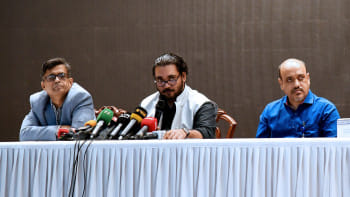Preludes to an avalanche of anger

Perhaps, as a writer, Mahbub Aziz is a helpless lonely person, like many out there, in the face of the incurable human injustices around us. Sometimes, he's an onlooker; sometimes he's a lamenter; and sometimes he's an aggrieved human waiting for a miracle to happen when it matters coming to terms with the agonized lives of the characters he's creating.
Aziz has a wonderful ability to create very common but significant characters that are always around us but we hardly notice them through a writer's eyes. Most of his protagonists are the victims and some are oppressors.
The main character in Kal bhorey jokhon kolingbel bejey uthhbey is a common and honest man with normal human dreams but helpless against the fraud and treachery committed to him. He's convinced that there's no place on earth where he can seek redress of the injustice committed to him. He prefers to keep quiet and withstand the calamity and tries to correct his own so-called error that takes place in the form of his innocence.
The salient features of his stories are the clouds overcast with social injustices over the weak, the helplessness of common people in the face of those injustices, and the agony of the wounds that are kept alive when there's no justice for the sufferers.
The most painful form of injustice is portrayed in Nodir parey boshey thaki shudhu [We only sit by the river] in which a group of young people, helplessly watch a woman being raped and killed by the people who are meant to save her. These young men are supposed to stand up against the injustice and help the woman, but they show an eerie nonchalance at the crime. This story, perhaps the most striking one in this collection, reflects the psyche of our society – a society full of scared people who perhaps have lost the courage to revolt, to begin an uprising and to change the unhealthy trends.
Aziz depicts many deaths in his stories. Kono somporko nei, Nodir parey boshey thaki shudhu, Mrito Abdul Jalil jokhon firey elen and Mrittu bhoyar jam gachher chhaya are the stories that deal with death.
In Kono somporko nei, two persons – one an elderly man and a young woman – go on a date outside Dhaka where they die suddenly. The children of the man come and take their father's body but they spend quite a lot of money in order to show that the deceased had died alone; there was actually no lady with him. The dead woman becomes a problem for the people who are alive. They deny any existence of the woman. In Nodir parey boshey thaki shudhu, a group of young men cannot do anything when a woman dies after being tortured by local political leaders. When Abdul Jalil, the prime character of Mrittu bhoiar jam gachher chhaya, everyone wants him dead again; everyone wants him to stay missing from their lives as they have all begun new lives of their own in which Jalil is a misfit and would only create troubles in their new lives.
Aziz's portrayal of death is a portrayal of a strange kind of nonchalance among the characters in his stories; they seem willfully oblivious about value of the dead people, while alive, put in their lives. It's a nice way of delineating how the living neglect the dead in our society.
The writer's language is lucid and there's no willful use of difficult words that might cause the readers to stumble; his diction rather helps the reader to finish a story in one go. Aziz, as a literary editor, has a great advantage regarding deciding about his own writing. As an editor, he has read volumes of short stories, essays and poems everyday for publishing in his magazine and that gives him an edge to know about thousands of styles that people are following these days. This also gives him an edge to decide on his own style to tell a story easily but imprinting the message of the story into the reader's mind. He is indeed very successful in doing this.
Sometimes, Aziz's stories would give rise of a sense of helplessness but most of the time, I felt, this sense of helplessness is a prelude to a huge avalanche of anger about regarding the injustices prevailing in our society. It seemed to me that there are a billion angry bubbling thoughts in the writer's head. He should do something about bursting those bubbles in order to come up with a revolutionary plot in his next book. I believe he would do very well in that.
The reviewer is a writer and columnist.


 For all latest news, follow The Daily Star's Google News channel.
For all latest news, follow The Daily Star's Google News channel. 



Comments